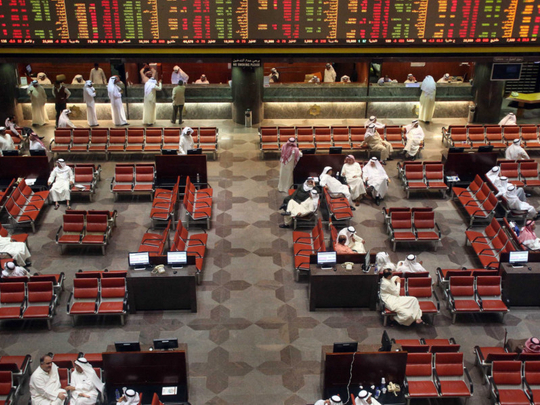
Abu Dhabi: Global equity markets took a dive on Thursday after an Arab coalition led by Saudi Arabia launched air strikes against Houthi rebels in Yemen, pushing oil prices up nearly six four per cent. Brent oil traded at $58 (Dh212.86) a barrel, up nearly 3 per cent but off peaks hit of nearly $60.
The rebels are backed by Iran, an important oil producer and a member of the Ogranisation of the Petroleum Exporting Countries (Opec).
The news about the attacks also took a toll on global equity markets with most Middle East stock markets initially falling on Thursday but coming well off their lows later in the day as the initial panic subsided.
The biggest drops in Gulf equities were in Oman and Kuwait, where markets closed around 2.5 per cent lower. Markets in Bahrain, Qatar and Dubai slipped just under one per cent.
The Dubai Financial Market (DFM) index fell more than five per cent in the first few minutes of trade alone. Powerhouses such as Arabtec and Emaar were down 7.4 per cent, and 5.6 per cent respectively at 10.30am. The market bounced back, though, ending the day with a drop of 0.8 per cent to reach 3,407.25, while the Abu Dhabi Securities Exchange (ADX) general index crawled up 0.03 per cent to reach 4,373.13.
In Saudi Arabia, the market reaction was similar with the Tadawul index reaching a low of roughly 8,500 — a four per cent dip — at the start of trade, while Qatar slid 3.5 per cent shortly after trade began. Saudi ended with a 0.4 per cent gain, though.
Other markets
US stocks, meanwhile, opened modestly lower on Thursday following bigger declines in Europe. US stocks opened 0.42 per cent lower, putting the S&P500 on track for a fourth straight decline. Dow Jones industrial index, too, slid 0.3 per cent to reach 17,665.02 at opening time, Reuters reported.
According to analysts surge in oil prices is temporary but it would depend on how events unfold in the coming days.
“This is short term noise. I see no reasons for it to rise much further now,” said Francisco Quintana, head of economic research at Asiya Investments.
He said Yemen is a minor oil producer, without capacity of impacting global markets. “Most of Saudi Arabia’s production is near Bahrain, so it won’t be disrupted. There is no chance that Iran will get involved in a serious manner. The country is now focusing on its nuclear deal and will not ruin the current good collaboration with the US in Iraq and nuclear affairs.”
He added that the US hit an all-time high in inventories and Saudi Arabia is producing close to 10 million barrels per day. “On the demand side, China and Korea are seeing a strong deceleration. Put everything together and you have low oil prices for the next few months. No changes until US supply adjusts, which might happen later this year,” Quintana said.
Supply chain concerns
An energy analyst based in Dubai said there are concerns over the safety pertaining to the energy supply chain specially disruption to the shipping lanes near Yemen from where oil is transported to Western countries from Arabian Peninsula.
“Any disruption to the shipping route near Yemen would escalate prices. There are also fears that Houthis and their allies could target oil production facilities in the Gulf region. Events in the coming days would be important to determine where the oil prices are headed,” said Theodore Karasik, an independent geoeconomic analyst. He added that what really concerned Saudi Arabia is the naval exercise conducted by Iran from Red Sea to the Strait of Hormuz, an important oil shipping route a few weeks ago.
Yemen is not a major energy producer or exporter compared with other countries in the Middle East. However, the country’s location at the Bab Al Mandab, a key checkpoint in international shipping, makes Yemen important in terms of international energy trade, US-based Energy Information Administration said on its website.
More than 3.4 million barrels of oil per day passed through Bab Al Mandab in 2013.
With inputs from agencies












